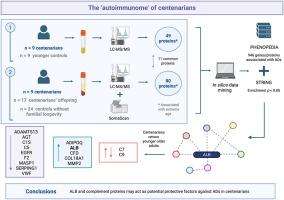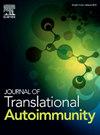The ‘autoimmunome’ of centenarians
IF 3.6
Q2 IMMUNOLOGY
引用次数: 0
Abstract
Objective
To identify signature proteins potentially linked to resistance to autoimmunity in the blood of centenarians.
Methods
We conducted in silico data mining of previously published proteomic results using the Search Tool for the Retrieval of Interacting Genes/Proteins (STRING) and PHENOPEDIA databases.
Results
Sixteen autoimmune disease-related proteins were identified within the proteomic signatures of centenarians. Albumin was the most connected hub protein, notably elevated in centenarians compared to younger controls, suggesting a protective role. Eight of the identified autoimmunity-related proteins—ADIPOQ, C1S, C5, C7, C9, CFD, MASP1, and SERPING1—were associated with the complement system.
Conclusion
Elevated albumin levels and a prominent complement system presence in centenarians' blood proteome may contribute to resistance to autoimmunity, highlighting potential protective mechanisms against autoimmune diseases in extreme longevity.

百岁老人的“自身免疫组”
目的鉴定百岁老人血液中可能与自身免疫抵抗相关的特征蛋白。方法利用Search Tool for Retrieval of Interacting Genes/Proteins (STRING)和PHENOPEDIA数据库对已发表的蛋白质组学结果进行计算机数据挖掘。结果在百岁老人的蛋白质组学特征中鉴定出16种自身免疫性疾病相关蛋白。白蛋白是最相关的中心蛋白,与年轻的对照组相比,百岁老人的白蛋白明显升高,这表明白蛋白具有保护作用。鉴定出的8种自身免疫相关蛋白(adipoq、C1S、C5、C7、C9、CFD、MASP1和serping1)与补体系统相关。结论百岁老人血液蛋白质组中白蛋白水平的升高和补体系统的显著存在可能有助于自身免疫的抵抗,揭示了超长寿命对自身免疫性疾病的潜在保护机制。
本文章由计算机程序翻译,如有差异,请以英文原文为准。
求助全文
约1分钟内获得全文
求助全文
来源期刊

Journal of Translational Autoimmunity
Medicine-Immunology and Allergy
CiteScore
7.80
自引率
2.60%
发文量
33
审稿时长
55 days
 求助内容:
求助内容: 应助结果提醒方式:
应助结果提醒方式:


